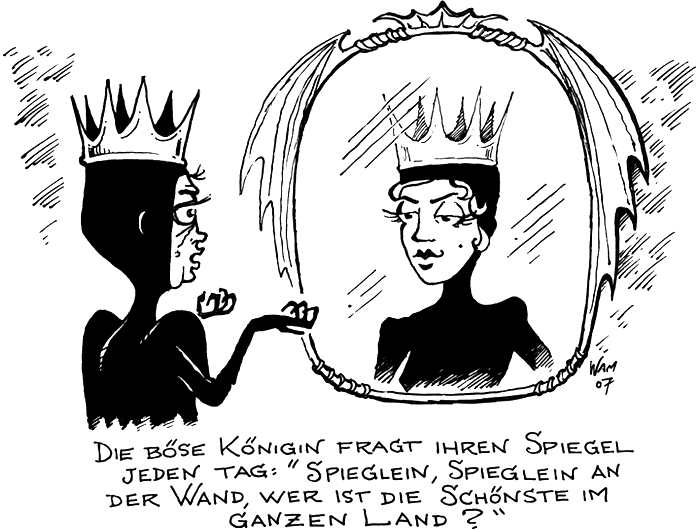Possessivpronomen als Artikel – Possessive Pronouns
Possessive pronouns are a type of determiner, similar in their function to definite (the, this, which?) and indefinite articles (ein, kein).
The nominative case is used to describe the subject of the sentence. The subject is the doer of the action or event. The accusative case is used to describe the direct object of a sentence. The direct object is the immediate recipient of an action or event:
| Schneewittchens Vater verliert seine Frau – und heiratet eine böse Königin! | Snow White’s father loses his wife – and marries an evil queen! |
| Die böse Königin fragt ihren Spiegel jeden Tag: “Spieglein, Spieglein an der Wand, wer ist die Schönste im ganzen Land?” | The evil queen, asks her mirror every day: “Mirror, mirror on the wall, who is the prettiest one of all?” |
Schneewittchens Vater is the subject in the first two sentences. Frau and Spiegel are who the king married and, what the queen asks; therefore, they need to be preceded by an accusative possessive pronoun/determiner.
The basic forms for Possessive Pronouns
These are the basic forms of the possessive determiners:
| ich | mein | my | |
| du | dein | your | |
| er | sein | his | |
| sie | ihr | her | |
| es | sein | its | |
| wir | unser | our | |
| ihr | euer | your (think ‘you guys‘) | |
| sie | ihr | their | |
| Sie | Ihr | your (formal) |
Here are the words and endings for the possessive pronouns in the Nominative Case:
| masculine noun follows (no visible suffix) |
feminine noun follows (-e suffix) |
neuter noun follows (no visible suffix) |
plural noun follows (-e suffix) |
| mein Kopf | meine Zunge | mein Haar | meine Augen |
| dein Kopf | deine Zunge | dein Haar | deine Augen |
| sein Kopf | seine Zunge | sein Haar | seine Augen |
| ihr Kopf | ihre Zunge | ihr Haar | ihre Augen |
| sein Kopf | seine Zunge | sein Haar | seine Augen |
| unser Kopf | uns(e)re Zunge | unser Haar | uns(e)re Augen |
| euer Kopf | eu(e)re Zunge | euer Haar | eu(e)re Augen |
| ihr Kopf | ihre Zunge | ihr Haar | ihre Augen |
| Ihr Kopf | Ihre Zunge | Ihr Haar | Ihre Augen |
Here are the words and endings for the possessive pronouns in the Accusative Case:
(Yes! Only the pronouns that are followed by masculine nouns change their ending; the others look exactly the same as the possessive determiners in the nominative.)
| masculine noun follows (-en suffix) |
feminine noun follows (-e suffix) |
neuter noun follows (no visible suffix) |
plural noun follows (-e suffix) |
| meinen Kopf | meine Zunge | mein Haar | meine Augen |
| deinen Kopf | deine Zunge | dein Haar | deine Augen |
| seinen Kopf | seine Zunge | sein Haar | seine Augen |
| ihren Kopf | ihre Zunge | ihr Haar | ihre Augen |
| seinen Kopf | seine Zunge | sein Haar | seine Augen |
| uns(e)ren Kopf | uns(e)re Zunge | unser Haar | uns(e)re Augen |
| eu(e)ren Kopf | eu(e)re Zunge | euer Haar | eu(e)re Augen |
| ihren Kopf | ihre Zunge | ihr Haar | ihre Augen |
| Ihren Kopf | Ihre Zunge | Ihr Haar | Ihre Augen |
| der Kopf | head |
| die Zunge | tongue |
| das Haar | hair |
| die Augen (pl) | eyes |


